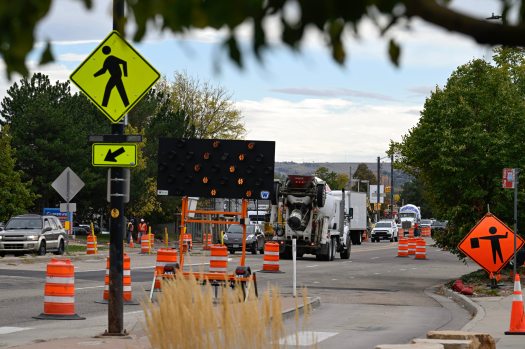UPDATE: The Boulder City Council has just approved a controversial $6.2 million transportation management fee aimed at funding vital infrastructure projects. The decisive vote, which took place on December 14, 2023, resulted in a 6-3 outcome, despite significant pushback from local businesses and residents.
This newly sanctioned fee will target most privately owned properties, with non-residential owners facing charges ranging from $11 to $160 annually per 1,000 square feet, depending on their land use. Single-family residences will incur a fee of $54 each year, while multi-family homes will pay $42. The ordinance is anticipated to bring in much-needed funds for the city, which currently faces approximately $6.4 million in annual unfunded maintenance needs, including crucial pavement and street safety management.
Why This Matters NOW: This decision marks a pivotal moment for Boulder, as the city grapples with escalating infrastructure costs. The council’s approval is seen as essential for addressing pressing maintenance issues, which have only grown more urgent over the years. However, the fee’s implementation has sparked fierce debate about its economic implications, particularly in the aftermath of the COVID-19 pandemic, which has left many businesses struggling.
Councilmembers Ryan Schuchard, Matt Benjamin, Tina Marquis, Nicole Speer, Mayor Pro Tem Lauren Folkerts, and Mayor Aaron Brockett voted in favor of the fee. In contrast, councilmembers Mark Wallach, Taishya Adams, and Tara Winer opposed the measure, citing inadequate outreach and potential burdens on local residents and businesses.
The council previously discussed this fee in the late 2000s and again in 2019, but it has faced significant resistance from the community at each turn. Wallach expressed his concerns during the meeting, stating:
“The engagement that’s being sought by the business community and residential owners is merely on the implementation. They have not heard of this, and I think they have a wider range of concerns.”
Moreover, Councilmember Adams highlighted the potential for rental rates to rise, saying:
“As somebody who is a renter, there is a possibility that they up the lease price in anticipation for something that would come.”
Despite the council’s approval, there is still one final reading required for the ordinance, but it is expected to pass without further opposition. Notably, both the Boulder Valley School District and the University of Colorado Boulder are exempt from this fee, although they may enter agreements to contribute to city funds.
The Boulder Chamber of Commerce has publicly expressed its resistance to the fee, with Senior Director of Policy Programs Jonathan Singer stating that the council should consider the changed economic landscape since the onset of the pandemic. He emphasized the need for collaborative approaches that balance infrastructure needs with the realities faced by local employers.
As the city prepares for the fee’s implementation, which will begin in mid-2026, residents and business owners are urged to stay informed and participate in upcoming discussions about the fee’s impact. The community’s response to this decision will be crucial as Boulder navigates its economic recovery and infrastructure challenges.
This developing story continues to unfold, and residents are encouraged to share their thoughts and experiences as Boulder moves forward with this significant infrastructure initiative.







